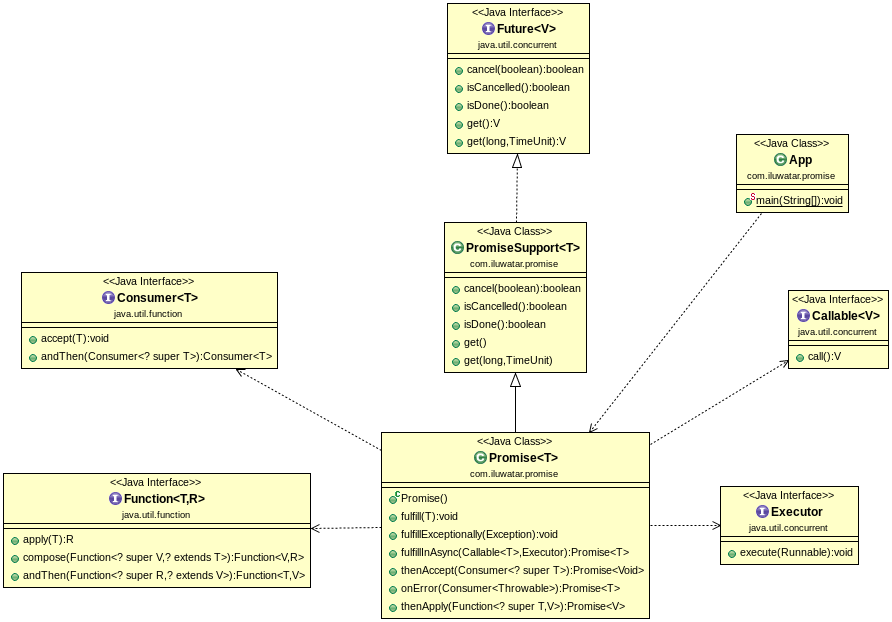Promise
Also known as
CompletableFuture
Intent
A Promise represents a proxy for a value not necessarily known when the promise is created. It
allows you to associate dependent promises to an asynchronous action's eventual success value or
failure reason. Promises are a way to write async code that still appears as though it is executing
in a synchronous way.
Explanation
The Promise object is used for asynchronous computations. A Promise represents an operation that
hasn't completed yet, but is expected in the future.
Promises provide a few advantages over callback objects:
- Functional composition and error handling.
- Prevents callback hell and provides callback aggregation.
Real world example
We are developing a software solution that downloads files and calculates the number of lines and
character frequencies in those files. Promise is an ideal solution to make the code concise and
easy to understand.
In plain words
Promise is a placeholder for an asynchronous operation that is ongoing.
Wikipedia says
In computer science, future, promise, delay, and deferred refer to constructs used for
synchronizing program execution in some concurrent programming languages. They describe an object
that acts as a proxy for a result that is initially unknown, usually because the computation of
its value is not yet complete.
Programmatic Example
In the example a file is downloaded and its line count is calculated. The calculated line count is
then consumed and printed on console.
Let's first introduce a support class we need for implementation. Here's PromiseSupport.
class PromiseSupport<T> implements Future<T> {
private static final Logger LOGGER = LoggerFactory.getLogger(PromiseSupport.class);
private static final int RUNNING = 1;
private static final int FAILED = 2;
private static final int COMPLETED = 3;
private final Object lock;
private volatile int state = RUNNING;
private T value;
private Exception exception;
PromiseSupport() {
this.lock = new Object();
}
void fulfill(T value) {
this.value = value;
this.state = COMPLETED;
synchronized (lock) {
lock.notifyAll();
}
}
void fulfillExceptionally(Exception exception) {
this.exception = exception;
this.state = FAILED;
synchronized (lock) {
lock.notifyAll();
}
}
@Override
public boolean cancel(boolean mayInterruptIfRunning) {
return false;
}
@Override
public boolean isCancelled() {
return false;
}
@Override
public boolean isDone() {
return state > RUNNING;
}
@Override
public T get() throws InterruptedException, ExecutionException {
synchronized (lock) {
while (state == RUNNING) {
lock.wait();
}
}
if (state == COMPLETED) {
return value;
}
throw new ExecutionException(exception);
}
@Override
public T get(long timeout, TimeUnit unit) throws ExecutionException {
synchronized (lock) {
while (state == RUNNING) {
try {
lock.wait(unit.toMillis(timeout));
} catch (InterruptedException e) {
LOGGER.warn("Interrupted!", e);
Thread.currentThread().interrupt();
}
}
}
if (state == COMPLETED) {
return value;
}
throw new ExecutionException(exception);
}
}
With PromiseSupport in place we can implement the actual Promise.
public class Promise<T> extends PromiseSupport<T> {
private Runnable fulfillmentAction;
private Consumer<? super Throwable> exceptionHandler;
public Promise() {
}
@Override
public void fulfill(T value) {
super.fulfill(value);
postFulfillment();
}
@Override
public void fulfillExceptionally(Exception exception) {
super.fulfillExceptionally(exception);
handleException(exception);
postFulfillment();
}
private void handleException(Exception exception) {
if (exceptionHandler == null) {
return;
}
exceptionHandler.accept(exception);
}
private void postFulfillment() {
if (fulfillmentAction == null) {
return;
}
fulfillmentAction.run();
}
public Promise<T> fulfillInAsync(final Callable<T> task, Executor executor) {
executor.execute(() -> {
try {
fulfill(task.call());
} catch (Exception ex) {
fulfillExceptionally(ex);
}
});
return this;
}
public Promise<Void> thenAccept(Consumer<? super T> action) {
var dest = new Promise<Void>();
fulfillmentAction = new ConsumeAction(this, dest, action);
return dest;
}
public Promise<T> onError(Consumer<? super Throwable> exceptionHandler) {
this.exceptionHandler = exceptionHandler;
return this;
}
public <V> Promise<V> thenApply(Function<? super T, V> func) {
Promise<V> dest = new Promise<>();
fulfillmentAction = new TransformAction<>(this, dest, func);
return dest;
}
private class ConsumeAction implements Runnable {
private final Promise<T> src;
private final Promise<Void> dest;
private final Consumer<? super T> action;
private ConsumeAction(Promise<T> src, Promise<Void> dest, Consumer<? super T> action) {
this.src = src;
this.dest = dest;
this.action = action;
}
@Override
public void run() {
try {
action.accept(src.get());
dest.fulfill(null);
} catch (Throwable throwable) {
dest.fulfillExceptionally((Exception) throwable.getCause());
}
}
}
private class TransformAction<V> implements Runnable {
private final Promise<T> src;
private final Promise<V> dest;
private final Function<? super T, V> func;
private TransformAction(Promise<T> src, Promise<V> dest, Function<? super T, V> func) {
this.src = src;
this.dest = dest;
this.func = func;
}
@Override
public void run() {
try {
dest.fulfill(func.apply(src.get()));
} catch (Throwable throwable) {
dest.fulfillExceptionally((Exception) throwable.getCause());
}
}
}
}
Now we can show the full example in action. Here's how to download and count the number of lines in
a file using Promise.
countLines().thenAccept(
count -> {
LOGGER.info("Line count is: {}", count);
taskCompleted();
}
);
private Promise<Integer> countLines() {
return download(DEFAULT_URL).thenApply(Utility::countLines);
}
private Promise<String> download(String urlString) {
return new Promise<String>()
.fulfillInAsync(
() -> Utility.downloadFile(urlString), executor)
.onError(
throwable -> {
throwable.printStackTrace();
taskCompleted();
}
);
}
Class diagram

Applicability
Promise pattern is applicable in concurrent programming when some work needs to be done
asynchronously and:
- Code maintainability and readability suffers due to callback hell.
- You need to compose promises and need better error handling for asynchronous tasks.
- You want to use functional style of programming.